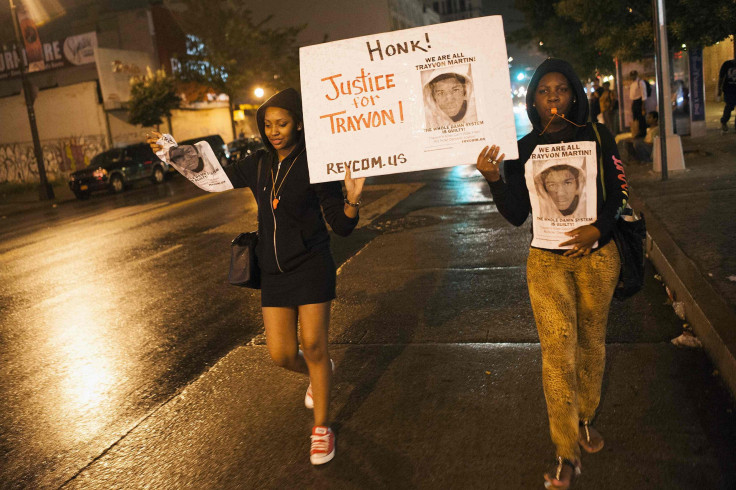Trayvon Martin Case: Gun Control Advocates Hope to Put Gun Debate Back in Spotlight

Since legislation to expand background checks for gun purchases failed to pass the U.S. Senate earlier this year -- even after the Sandy Hook school massacre -- talk of gun control has been largely dormant. But advocates for stricter gun laws hope the acquittal of George Zimmerman in the shooting death of 17-year-old Trayvon Martin will put the gun debate back in the spotlight.
In a series of statements following the verdict late Saturday night, gun control groups have argued that Florida laws, including the so-called “stand your ground” rule, set the stage for Martin's death: In short, they say that Zimmerman, who had a history of violence, was allowed to carry a concealed weapon and then use it in supposed self-defense rather than retreat. But there was little talk of the gun issue in Washington on Monday.
“America should learn from Trayvon Martin’s death that more guns in public do not make us safer, and use this tragedy as an opportunity to closely evaluate our nation’s gun laws,” Juliet Leftwich, legal director of the Law Center to Prevent Gun Violence, a San Francisco-based group working to implement stricter gun laws, said in a statement Monday.
“There is sharp disagreement over the verdict, but there can be no disagreement over the reason why Trayvon Martin is dead,” Dan Gross, president of the Brady Campaign to Prevent Gun Violence, said in a statement Saturday. “George Zimmerman had a gun that night, and the state of Florida allowed him to carry it virtually anywhere despite a violent history.”
New York Mayor Michael Bloomberg, a high-profile leader in the gun control movement, told the New York Times, “One fact has long been crystal clear: ‘Shoot first’ laws like those in Florida can inspire dangerous vigilantism and protect those who act recklessly with guns.”
President Barack Obama also alluded, lightly, to the gun issue in his own statement on the case Sunday, “We should ask ourselves if we’re doing all we can to stem the tide of gun violence that claims too many lives across this country on a daily basis.”
But at Monday’s White House briefing, Press Secretary Jay Carney shied away from discussing Florida’s “stand your ground” law, under which Zimmerman was authorized to use force to defend himself in a conflict rather than retreat. “I mean, this is a state law that you’re referring to. And again, within the context of this case, I just don’t have any comment from the president to provide to you,” Carney said, saying only that Obama believes the case “reflects and symbolizes the loss we see daily in this country of young people to gun violence.”
The gun issue is likely to remain in the spotlight as administration officials travel to Florida to address the annual convention of the National Association for the Advancement of Colored People in Orlando this week, where gun violence is a top agenda item and the verdict is a fresh wound. Among this week’s speakers are Attorney General Eric Holder, Health and Human Services Secretary Kathleen Sebelius and Housing and Urban Development Secretary Shaun Donovan. The NAACP has also been in the spotlight since the verdict, circulating a petition calling on the Justice Department to pursue a civil rights case against Zimmerman. But Carney addressed the issue only when prompted by reporters, saying simply that the administration remains dedicated to implementing sensible gun reforms and that the three agency heads would likely make that point in Florida.
But gun control advocates pushed back on the idea that their movement has lost steam in recent months. “The media has a very short attention span,” said Ladd Everitt, a spokesman for the Coalition to Stop Gun Violence, which advocates for stricter gun laws. The case is now “another event in a long chain of events in the past two years that has further heightened awareness among the American public” to gun issues.
“We’re still in active communication with offices on Capitol Hill,” Everitt said. “We’re still hearing from Senate Majority Leader [Harry] Reid and others that they are pressing to get the votes they need to bring [the background check bill] back for another vote after the August recess.”
A spokesman for Sen. Reid, D-Nev., did not respond immediately to a request for comment.
© Copyright IBTimes 2025. All rights reserved.






















